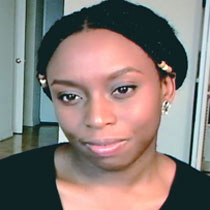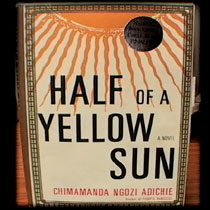2007年VOA标准英语-Chimamanda Ngozi Adichie's Latest Novel Remembe
搜索关注在线英语听力室公众号:tingroom,领取免费英语资料大礼包。
(单词翻译)
By Carolyn Weaver1New York City
25 April 2007
Chimamanda Ngozi Adichie's acclaimed2 second novel, Half of a Yellow Sun, tells the story of a devastating3 moment in Nigerian history, the short existence of the breakaway country of Biafra. VOA's Carolyn Weaver talked with Adichie and has this report.

Nigerian writer Chimamanda Ngozi Adichie
"I grew up in the shadow of Biafra,” the 29-year-old author said in a recent interview. “I grew up knowing that Biafra was so central to my history, that the reason I hadn't known my grandfathers was because of Biafra."
Adichie's family is Igbo, the ethnic4 group in eastern Nigeria that founded Biafra in 1967, following massacres5 of Igbo by other ethnic groups. Half of a Yellow Sun -- the title refers to the emblem6 on the Biafran flag -- tells the story of the doomed7 republic's short life. Nigeria's war to reclaim8 Biafra included a blockade that caused the deaths of an estimated one million people, most from hunger or disease, including both of Adichie's grandfathers. She wasn't born then, but she says memories of that time are still very much alive.
 |
| Half of a Yellow Sun dramatizes Biafra’s brief existence, 1967-1970 |
The novel's cast of characters include Igbo people from all parts of Nigerian society -- from servants and villagers to professors and wealthy elites11. It also has sympathetic characters from other major ethnic groups, including the Yoruba and Hausa peoples.
"I wanted to write a book that had sympathy for Biafra, which I do, and which I don't apologize for,” Adichie said, “but also which doesn't demonize the other side, because they were just as ordinary and human as the people in Biafra."
She also wanted to show the importance of class, she said. “Class determined12 what Biafra meant to different people. And so for example, my parents, who really did go through awful experiences, didn’t suffer half as much as people who had nothing to start off with.”
Adichie’s parents were middle-class academics who lost all their possessions except for the car they fled in, she said. But they survived, and went back to their jobs in the university. Others died or simply vanished in the chaos13 of war and famine. Adichie said the book is a tribute to their suffering and lost history.
“I think Ugwu, who is the houseboy, is the soul of the book,” Adichie said. “He came from hearing stories of my mother’s houseboy during the war. My mother talked about how really indispensable he had been to her, and how wonderful he was. And I started to imagine him and his life. We don’t know what happened to him, and I wish we could find out. He left after the war and my parents didn’t hear from him.”
The point of view in Half of a Yellow Sun shifts among several main characters, including the wealthy Olanna and her servant Ugwu. Adichie read aloud a passage from the novel in which Ugwu witnesses a child killed in an air attack.
"The evening they arrived, the sound of the antiaircraft guns cut through the refugee camp just before dusk. The mother ran out and held him, her only child, in a confused hug. The other women shook her roughly as the wa-wa-wa roar of the overhead planes came closer. Come to the bunker! Are you mad? Come to the bunker! The woman refused and stood there holding her son, shaking.
Ugwu still did not know why he had done what he did. Perhaps it was because Olanna had already grabbed Baby and run ahead of him and his hands were free. But he reached out and pulled the child from the woman's embrace and ran. The child was heavy then, still weighed something; his mother had no choice but to follow. The planes were strafing, and just before Ugwu shoved the child down into the bunker, a bullet flew closely past; he smelled rather than saw it, the acridness of hot metal.
It was in the bunker playing in the damp soil that crawled with crickets and ants that the child had told Ugwe his name: Chidiebele or Chidiebube, he was not sure. But it was Chie-something. Perhaps Chidiebele, the more common name. The name almost sounded like a joke now. Chidiebele: God is merciful."
“I remember when I was writing it and often stopping to think that it really, it was really real,” Adichie said. “He could have been my cousin. And also just thinking about how people, how they went on, because life had to go on -- and the incredible courage of it. Because I don’t know if I had been alive then, if I would have had that sort of matter-of-factness.”
Half of a Yellow Sun garnered14 rave15 reviews and award nominations16 in Britain and the U.S., where it was a finalist for the National Book Critics Circle award for fiction. Now living in New Haven17, Connecticut, Chimamanda Ngozi Adichie is studying African history at Yale University. She says her next novel will be about Nigerian immigrants to the U.S.
 收听单词发音
收听单词发音 




